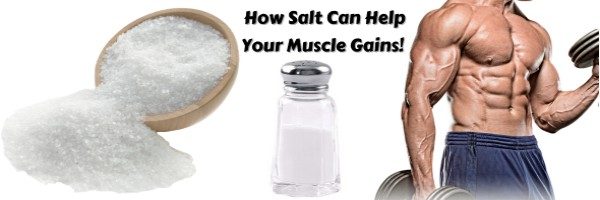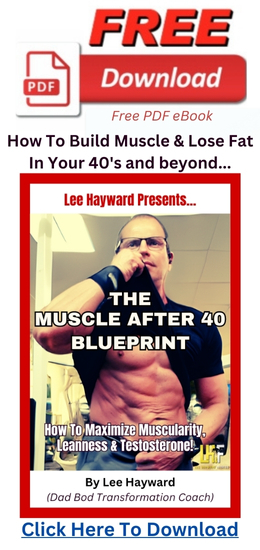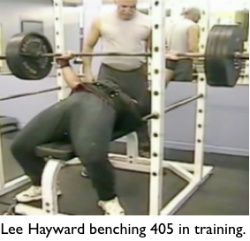One very controversial topic in the health and fitness industry is Sodium Intake…
The average Joe Blow doctor will tell you to cut back on your sodium intake and will talk down about sodium like it’s the root of all evil. They’ll tell you about how it will cause high blood pressure, heart problems, kidney problems, etc.
But 99% of the time the doctor is giving this advice to sedentary individuals. Not hard training athletes and bodybuilders. So if your workout routine consists of walking from the fridge to the sofa and the occasional jog to the toilet then keep listening to your doctor’s advice…
However, if you are here reading this article right now there is a good chance that you are NOT the typical sedentary couch potato. And if that’s the case the rules about low sodium intake do not apply!
In fact for hard training athletes too little sodium can cause more problems then consuming too much. Low sodium intake causes muscle cramps, dizziness, and electrolyte imbalances, which can cause neurological problems, or even be fatal (yes you read right!)
Drinking too much water, with insufficient sodium intake, puts a person at risk of water intoxication (hyponatremia) which can cause a seizure or coma.
Watch My Video About Sodium Intake For Bodybuilders & Athletes…
If you can’t view the video here, you can watch it on YouTube at…
https://www.youtube.com/watch?v=rIlCcwWbqbI
What Is Sodium?
Sodium is a mineral element and an important part of the human body. It controls the volume of fluid in the body and helps maintain the acid-base level. About 40% of the body’s sodium is contained in bone, some is found within organs and cells and the remaining 55% is in blood plasma and other fluids outside cells. Sodium is important in proper nerve conduction, the passage of various nutrients into cells, and the maintenance of blood pressure.
The body continually regulates its handling of sodium. When a person eats too much or too little sodium, the intestines and kidneys respond to adjust concentrations to normal. During the course of a day, the intestines absorbs dietary sodium while the kidneys excrete a nearly equal amount of sodium into the urine.
The concentration of sodium in the blood depends on the total amount of sodium and water in arteries, veins, and capillaries (the circulatory system). The body regulates sodium and water in different ways, but uses both to help correct blood pressure when it is too high or too low.
If the body has too little sodium (called hyponatremia), the body can either increase sodium levels or decrease water in the body. Too high a concentration of sodium (hypernatremia), can be corrected either by decreasing sodium or by increasing water intake.
Sodium Intake For Bodybuilders & Athletes
If you are doing hard weight training and / or cardio workouts and sweating a lot. Then you need to replace the sodium you lose in order to maintain a healthy electrolyte balance in your body.
And if you are following a fat loss diet or cutting back on your carbohydrates, then you actually need to “Increase” your sodium intake. Carbohydrates will cause your body to retain water and sodium. Generally for every gram of carbs you eat your body will hold 3 grams of water. So if you switch to eating a lower carb diet you will lose a lot of extra water and sodium.
When I’m dieting for fat loss I purposely add salt to my food and even flavor my food with high sodium condiments like soy sauce. It will help you feel stronger and it will replace the sodium that you lose from sweating doing your weight training, cardio, etc.
In fact a lot of the negative aspects people experience from “low carb dieting” such as feeling weak, flat, low energy, etc. is not really due to the carbs at all. But from low sodium levels in the body. If you experience any of these symptoms, increasing your salt intake will generally make you feel A LOT better and more energetic.
I even go so far as to carry salt packets (just like you get at the fast food restaurants) in my gym bag. This way when ever I feel the effects of low sodium during my workouts. Such as muscle cramps, dizziness, etc. I’ll rip open a packet of salt and chase it down with some water and within 5 minutes I’m feeling much better.
Bottom Line…
For athletes and serious fitness enthusiasts you are more likely to need to increase your salt / sodium intake rather than reduce it. You need to replace what you lose from sweating in order to keep your electrolytes in balance and train hard in the gym.
Now I don’t actually break out the calculator and count my sodium intake, and I doubt that many other people do either. But I don’t shy away from consuming sodium. The best advice I can offer is to keep tabs on how you feel, your energy levels, etc. and if you do feel light headed, dizzy, or experience muscle cramps during your workouts. There’s a good chance that low sodium is causing it.








62 Comments
Comment navigation
Hassan
hey thnx for the info lee. I never sodium had some effect on our workouts. Cause i always say no sodium on what i eat, at some point i feel tired and after a workout i stretch and feel a cramp on my hamstrings or calves. thnx again for the good info.
Wayland
Wow. This is really cool man. Thanks for this. It should be common knowledge but it’s great that you’re getting the word out yourself.
Jerry K.
LEE, of coarse, without a well balanced diet, your sodium intake wont matter because your body is already depleted from the resources it needs. Im sure there will be people reading this article, thinking this is their mis sink link.
-Going along with the original topic, I sometimes add salt to my protein shake (pwo). I know you do this to Lee. I add about a dash or so. Nothing to crazy but nothing to little either. The salt i use is Mortons “lite salt”, which is basically half-sodium,half-pottasium…That way both my potassium and sodium levels have a little replenishment PWO.
rodrigo
so lee does that means its ok to drink a diet coke since it only has sodium
Suneet R
Hi Lee,
This is really a good piece of information.I have always thought and have been directed to have low sodium to cut down on fat , and in turn i got rid of it and was taking very low amount of salt in my diet.This made me feet flat many times post my workouts and strteched for long hours.
Hope changing this would help in regainging my energy levels even after hard work outs.
Miguel
Great info! Never would have assumed otherwise!
Elmore Frank Brown Jr
Oh, I did not know that I need sodium in my body since I work out in the gym. But I thought if you take to much sodium you will have high blood presure? Why do you must have sodium when you work out? I thoought salt is bad for you. Ok I will try to take a little more sodium to see what happend to my body. Please let me know?
Kevin
hey lee annd anyone listening, while ur answering questions, jus thought id ask u something about my workouts. I struggle to maintain my reps when im doing a certain excercise e.g: my first set ill do 8, second set 8 and last set maybe 5 or 6 and i have a 1 minute break between sets…..is this normal?
Najib
Hey Lee,
Thanks for your valuable info as always!
By the way I cant seem to purchase ur products thru clickbank, coz my country is not registered with them 🙁
Is there an alternative method of buying apart from Clickbank?
Plz advice….
Bigrich
great info lee i luv a little in my shakes pwo as well. water, protein, 50/50 dextrose/maltodextrin and some sodium postworkout is a must.
Peter
There are numerous salts, Himalayan Salt is the best!! I even add it to my fitness shakes with some ginger, tumeric and even some chilies if I feel a cold coming on 🙂
Adding spices are great way to give your system a boost, I buy organic. They are very cheap also:))))))))
Lee Hayward
Just e-mail my customer support lee@leehayward.com and we’ll see what we can do to help you out.
Lee Hayward
Of course it’s normal, you are fatiguing with each set. Everyone is like this.
Lee Hayward
I’ll occasionally have a diet soda, etc. but don’t make it a regular thing. Focus on drinking pure water as your beverage of choice and you’ll be a lot better off health and energy wise.
leehayward
You should re-read the blog post again, I pretty much answer everything you asked within the post.
Anthony
Great piece Lee! I did not know the full extent of the importance of sodium levels in the body, thanks for sharing.
Robin a woman
I think this is opening a can of worms. I usually post your blogs for my clients to read…but with most of them rocking 200 lbs. or more, I would hate to see them splurge on salt. I know you emphasized a pre-conditioned athlete would use enough salt to need replacement, but what about the 200 lbs. person struggling with weight loss who you can do only certain exercises with…won’t salt hinder their weight loss….??? Thanks..and I’m a girl. You always address me as a man in the emails I get..thanks.
Dallin
Hey thanx. That explains a lot. I am
doing extensive training for an iron man but I keep getting light headed An faint. I will try adding some salt to my food to see if this helps
Lee Hayward
Sodium isn’t going to hinder fat loss, in fact it could help because it will allow the person to train at optimal levels.
Regardless of bodyweight, if someone is training hard, sweating a lot, and they experience muscle cramps, light headed, dizziness, etc. then it could quite likely be due to lack of sodium.
The key is to look for the symptoms of low sodium before you go increasing your sodium intake. Just like you wouldn’t go popping aspirin if you don’t have a head ache, you aren’t going to go increasing your salt intake if you don’t need it.
krissym
Tried and tested your “Bench pressing”techniques today an weirdly enough for the first time in a long time got helishly dizzy during the exercise this might explain why.the same goes for feeling tired straight after a workout through the years of training and asking other bigger men i have never heard of it.Thanks for the tip.P.S the “Bench Press”technique you emailed me the other day i noticed almost straight after my work out how much better a work out i had.It all makes sence.ta m8
David ROCK Nelson
Thanks, LEE! THis is SUCH important info. & I especially realise this, as I passed out, after being winded & feeling dizzy this past Sat. afternoon(3-27-10) at 3:30 pm. I have been cutting down on carbs(carbohydrates) lately, in an effort to help reduce belly fat & harden up my 53 years young physique. After reading this here, it really makes sense, as the docs at VA even gave me sodium. Obviously, without enough sodium, especially doing strenuous activity, like jogging, etc, one can become faint & pas out, like I did last Saturday. Thanks for this advice, it is much needed. -Your “Fiend”, ROCK! David ROCK Nelson, Sci-Fi/Monster-comedy movie maker, actor, comic, former Marine(served 1976-80), former Chicago Golden Gloves boxer during 3 decades(76, 88 thru 91, at age 34) & an all-Natural drug-free bodybuilder.
Adam
learn something new everyday great tip!
Kevin
do u think 8 8 6 is a rep range that will allow me to gain mass
Justin Bethune
Well put Lee. I completely agree with you on the soy sauce, but I like to use Dale’s sauce, just soy sauce with some other spices basically. I am 10 weeks out from my show right now and i cook my Chicken with Dales every day and it really helps me out while doing my hour cardio sessions, especially since its nearing the upper 80s here every day, God I’m glad winter is over!
Anyways great post Lee keep up the great work man!
Justin Bethune
Team TNT Performance
Imerson
That’s a great read! I didn’t think of it that way. I love salty food, but I always thought that too much salt is bad. Maybe I don’t have to cut back after all.
Balraj,Mumbai,India
Thanx Lee for the information provided I was having the same problem but could not make out the cause of it.especially the symptoms increased in summers.Now i will keep a tab on my sodium intake and overcome my problem.thanx again.
YOU WERE ALWAYS MY GUARDING FORCE
Rudy
this is a valuable information you’ve shared
thanks Lee!
Tony d
I agree that sodium is not evil – except when it is in foods that contain MSG, However, using only sodium and garbage drinks like Gatorade is a big mistake. When the body depletes sodium, other minerals are depleted also. If you want to replace all electrolytes, drink 25% diluted orange juice or lemon juice – or better still, eat the whole fruit including the white rind. Other dry fruits are also helpful, especially apricots. If you can’t do this, get a complete electrolyte replacement drink at the healthfood store or in some gym stores. One good electrolyte supplement, that also contains anitoxidants and even joint replacement aids, is Emergen-C.
Marc Boudreau
i like salt a lot. But it obvious i was not eating enought. i felt like i had no energie all the time and my head would spin too. Thanks lee this is very helpfull.
Garett Collins
Hey Lee,
I am a high school athlete. My football team just started doing double days and its been brutal. We workout and condition in the am and we have a 3 to 4 hour practice starting at 3. I sweat more than most people doing normal things like walking around the mall or something basic. So you could imagine how much i sweat running and hitting with full pads on in the hottest part of the day. Its literally like a waterfall down my face. Let me put it this way… Ive gotten a bloody nose 3 days in a row and didnt even realize it cause i thought it was just sweat. Now i’ve never liked salt and dont eat too much of it. During double days ive just been taking protein shakes and ill try to eat something basic when i dont feel nausea. Now during practice im drinking tons of water and nothing else. But in the end of practice when were running hills (kind of like what the san francisco 49ers do just more steep and on dirt) my quads cramp so bad that i cant even kind of bend my leg with out agonizing pain… And yesterday my lower abdominals cramped so bad i capsized over in pain. So you think if i eat/drink more salt, sodium, electrolytes, these cramps will stop? I get cramps in my hamstrings, calfs, and neck too but my quads kill me the most. And ive never had my abs cramp before and it kinda scared me. Do you have any other advice other than eating more salt?
Paul D.
I’ve always wondered if sodium comes into play when it comes to bodybuilding nutrition. Great article, Lee!
leehayward
==================
A lot of people mistakenly think sodium is a “Bad Thing” that should be avoided at all costs, but it’s not the case. When you consume adequate sodium intake it’s a huge energy booster and you just feel better and stronger in the gym.
Andy
Thanks again,this is crucial info
Frank A
Hi Lee, Good info. Suggest Himalayan and Celtic Sea and Hawaiin Sea salt as better alternatives as they are not processed with chemical and they contain minerals where table salt doesn’t.
leehayward
==============
For sure, I personally use sea salt in all my cooking. Not only is it better for you, but I find it tastes a lot better than plain table salt as well.
Al
Lee,
Thanks for the tips. I at times have had slight lightheadedness near the end of my work-outs. I increased my salt intake and noticed a difference. Tips like this keep me coming to this site.
gerry
Great advise Lee. I’ll add some salt to my protein smoothy. I found a reference to a book “Your not
sick your thirsty”. It claims we ordinararily need at least a teaspoon of salt per day. Also, chronic
dehydration symptoms are heartburn, cramps etc.
Leon
I dont agree with this appoach, as there are several types of Sodium.
There is the Mineral Sodium, that mother nature gave us, that we destroy with our factories plus genetic modified food.
And there is Salt\sodium men made, those are found everywhere, in restaurants and the worse thing- people dont acknowledge this sodium makes them prone to deceases and bone weekness which leads to bone injuries like back or knee bone pain.
Check Pal Brag- his views are not the typical bodybuilder but for the person who cares for his health- which bodybuilding isnt exactly supporting.
jp
thanks for the infoI am really trying to watch what I eat thanks again
bala
good information. thank you lee brother…please mention the quantity of sodium intake per a day.
Jerry
Thanks again for another informative article. I always avoid excess salt intake like the plague since most of what I eat seems to contain nearly half of my rda according to the label. I date back a few years, and I can remember my high school track coach dispensing salt pills to the team to avoid cramps.
Ian S.
There should definitely be more emphasis placed on maintaining salt/electrolyte levels in folks who workout with any regularity. I have had a long time struggle with PLMD (periodic limb movement disorder) at night and it was disrupting my sleep as well as my wife’s.
After extensive online research and looking into all sorts of unusual home remedies (none of which worked), I stumbled across the connection between electrolytes and nerve function. By consuming extra electrolytes, I now sleep, lift, run, and play basketball at a much higher level. It’s very simple nutrition that most of us are overlooking.
I have personally had success with three types of electrolyte sources: pickle juice, coconut juice, and Pedialyte (I use the generic store brands since they’re half price and work the exact same).
For the pickle juice, there is actually a company in Texas that bottles and sells it as a sports drink (http://www.goldenpicklejuice.com/). I think this works the best since it’s so concentrated and fortified; however, if you don’t live in Texas it’s a little pricey to ship and they use Yellow 5 to make it look like Gatorade.
Hope this helps!
Jim Fidelholtz
Hi, Lee,
About sodium: I subscribe to some email lists from NIH on various health topics. Some months ago, one of them sent me a surprising blurb about sodium, from a British study. The summary said that they studied several thousand men over 9 (I think it was) years. At the beginning, they asked them how much salt they usually used, and divided them into 4 equal groups, from low sodium to high. While I haven’t read the original, the report was that the group which used the lowest amount of sodium had *more* heart attacks than the group which used the highest amount of salt. The summary didn’t mention the two middle groups of sodium intake, but one assumes that they had fewer heart attacks than the other two groups.
Like you said, a doctor told me years ago to lower my salt use, and since then I had pretty much stopped adding salt to anything, but after reading that, I’ve begun to add a little salt to my food, when cooking, etc.
The results, of course, have to be checked by other studies, but they are surprising (to say the least) to everybody. As everybody knows, though, unless you are *very* attentive to exactly what you are eating, there is usually no need to add salt, since ANY processed food has TOO MUCH salt, and most prepared fresh food, even, has too much salt added by the cook. I haven’t noticed any particular ill effects, though, since moderating (upward) my salt consumption, although just slightly.
leehayward
When it comes to health issues, I think it’s more of a lack of water that causes problems. Rather then an abundance of sodium. When you drink adequate water intake along with increased sodium your body will use what it needs and flush out the rest.
George Alford
Hi Lee,
Thank you for this information, because I have for several years or more, been having serious problems with leg and foot cramps. You see, I am a mechanic at the airport here in Rhode Island, and I work on the conveyors. It’s hot, and I sweat a lot. Sometimes, I would be kneeling on a belt, for an hour or so doing maintenance, and my quads would cramp right up so bad, I would have to stop and try to stretch it out before continuing, and then it would happen all over again when I started back. My doctor thought it was my Pravitatin medication, and cut it back, and then off it. It didn’t make a difference, but then one day, I thought about how back when I was a Boilerman in the Navy, they had a supply of salt tabs available for us, to replace the sodium lost from sweating, and I started adding more to my diet, and low and behold, no more cramps. This article confirms my hunch, and I thank you!
ben
thanks learn something every day
Daniel
We’re your bmi calculator iv been looking for ages.cheers
nocurls nogirls
Hey Lee, I’m currently in my 5th year of studying nutrition and I’d just like to inform you that its not the sodium level specifically but the ratio of sodium to potassium levels! diets low in sodium require low levels of potassium and diets high in potassium require higher levels of salt.
If you want to get into the nitty gritty, the electrolyte balance determine the rate of exchange of certain sodium/potassium pumps responsible for membrane charge, and rates of exchange of other molecules.
Great article otherwise, and personally I avoid salt if I can help it because most foods I personally consume has salt in it.
mike
thanks for the info
Robert
Hi Lee,
Thanks for that info, I did not know how much that salt played in weight training, or exercising in general.
It really explains a lot, interesting stuff.
Comment navigation